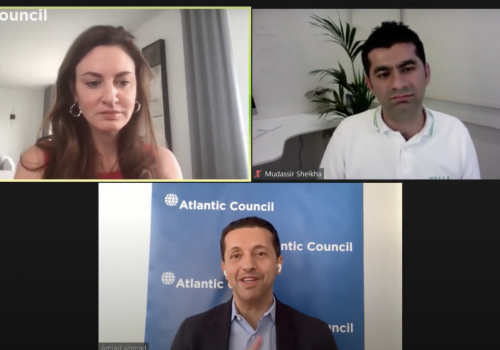Moving the Arab population from ‘job seekers’ to ‘job creators’: How governments are promoting and supporting entrepreneurship
On February 7, the Atlantic Council’s empowerME Initiative held a virtual event on “Developing ecosystems: How Middle East governments drive entrepreneurship.” The event featured the United Arab Emirates’ (UAE) Minister of State for Entrepreneurship and Small and Medium-sized Enterprises (SMEs), H.E. Ahmad Belhoul Al Falasi, Jordanian Minister of Digital Economy and Entrepreneurship, H.E. Ahmad Al-Hanandeh, Egyptian Minister of International Cooperation, H.E. Dr. Rania Al-Mashat, and Bahraini Minister of Industry, Commerce, and Tourism, H.E. Zayed R. Alzayani, to shed light on how their governments are nurturing innovation.
At the event, the empowerME Initiative also launched the Middle East Entrepreneurship Program Tracker created in partnership with Lebanon-based Imagine Labs. The new interactive tracker maps out organizations that regional governments have founded, funded, or partnered with to support entrepreneurs, startups, and small and medium-sized enterprises.
Below are the key takeaways from the discussion:
UAE Minister of State for Entrepreneurship and SMEs Ahmad Belhoul Al Falasi
- Al Falasi said that “the UAE has long been a trade hub and a financial hub. What we are trying to do now is make it an entrepreneurial hub as well” and described the UAE’s strengths as “the demographics and access to talent around the region.” He noted that the UAE is the top country of choice for young Arabs to live in, according to the Arab Youth Survey.
- Al Falasi mentioned a change the UAE has made to support entrepreneurship and provide talent with flexibility: introducing an entrepreneurial visa that allows foreigners who have previously established businesses to come to the UAE without being sponsored by a company.
- Despite the UAE producing the region’s largest unicorns and enjoying record-breaking increases in venture capital funding, the challenge, said Al Falasi, is that attitudes about entrepreneurship still need to shift. Due to the blessing of hydrocarbon wealth, government jobs were long seen as the go-to path. The UAE has launched programs at schools and universities to encourage students to consider entrepreneurship.
- When asked about the new corporate tax, Al Falasi explained that this tax would be accompanied by a reduction in up-front fees, which used to be high. He added that the new tax will also be friendlier to startups or companies with temporary performance issues, as opposed to fees in the past that had to be paid regardless of performance.
Jordanian Minister of Digital Economy and Entrepreneurship Ahmad Al-Hanandeh
- Al-Hanandeh highlighted the importance of regional cooperation to promote entrepreneurship and explained that youth surveys indicate that attitudes about entrepreneurship are improving, with 45 percent of youth saying that they would like to work at a startup in recent years.
- In terms of steps to grow Jordan’s entrepreneurial ecosystem, Al-Hanandeh highlighted that the country is focusing on increasing access to finance and markets, improving regulatory environments, and ensuring the continuous supply of talent to the ecosystem.
- When asked about the challenge of startups founded in Jordan that eventually move their operations to another country, Al-Hanandeh responded that Jordan doesn’t mind “being the launchpad for businesses” because this is positive for the country, even if companies eventually decide that relocating to somewhere else is important to help them scale.
- Al-Hanandeh pointed to the banks in Jordan that announced a digital transformation and argued that the COVID-19 pandemic helped with the move to a more open economy rather than a highly-regulated economy. He also noted that Jordanians are increasingly interested in digital assets, digital currency, and Artificial Intelligence, with about 140,000 Jordanians currently owning digital currency.
Egyptian Minister of International Cooperation Rania Al-Mashat
- Al-Mashat called entrepreneurship a “core” priority for Egypt and other countries in the Middle East, explaining that, “by the demographics of the region—and if we take the case of Egypt—we have more than 60 percent of our population below the age of 35. Therefore, for jobs to be created, private sector engagement is very, very important. And the types of jobs that need to be produced as well are not traditional jobs that you see in the public sector or even regular private sector jobs.”
- Al-Mashat highlighted the need for more innovation and entrepreneurs to address climate change and environmental challenges. She elaborated that the region needs to ensure its talent is “digitally savvy” and open to taking risks.
- Al-Mashat explained that Egypt has embarked on a structural reform program, with one pillar relating to telecommunications and information technology, which will create more incubators in schools and universities to encourage risk-taking.
- When asked about the positive momentum of entrepreneurship in Egypt, Al-Mashat credited Egypt’s youth for this shift, explaining that there is a growing demand for innovative jobs from youth that are connected online to a global network of information. The Egyptian government, in turn, is working to support entrepreneurs, dismantle historic regulatory barriers, and connect entrepreneurs with each other and with mentors globally, knowing that success stories like Anghami—the first Arab tech company to list on the US stock market—will inspire others.
- Al-Mashat mentioned that the government meets with entrepreneurs to better understand how policymakers can help startups, such as making it easier for talent to come to Egypt and investing in re-skilling programs for women.
Bahraini Minister of Industry, Commerce, and Tourism Zayed R. Alzayani
- Alzayani explained that access to finance and markets hasn’t been a barrier to promoting entrepreneurship in Bahrain as much as the dearth of mentorship and leadership needed to promote the cultural change that champions entrepreneurship.
- Alzayani mentioned that Bahrain has changed its bankruptcy laws to allow businesses to restructure—similar to Chapter 11 in the United States—to help encourage entrepreneurs to take risks and provide a safety net enabling many company leaders to bounce back.
- Alzayani argued that the discovery of oil created a generation that is more dependent on the state than on its own initiative and, therefore, Bahrain must convert the youth mindset from being “job seekers” to “job creators.”
- Alzayani noted that scaling is crucial due to Bahrain’s small population and that, in order to have success, entrepreneurs must think on a global scale from day one.
- Alzayani identified “the biggest challenge” to entrepreneurship as the social fear of failure within Bahraini culture. He argued that this “generational” issue will take time to resolve and that, from a young age, the values of experimentation, risk-taking, and learning from failure need to be included in the education system. He added that success stories will be the “biggest inspiration” and a “game changer.”
- Alzayani noted that, because Bahrain desires to be a global player, the government encourages people from all nationalities to use Bahrain as a springboard to start their company. He pointed to the success of FinTech Bay as one example of the sandbox Bahrain has created for experimentation and added that the new “golden residency” program allows foreigners to come to the country to start a business without a local sponsor.
Hezha Barzani is a project assistant at the Atlantic Council’s empowerME Initiative.
Further reading
Tue, Jan 18, 2022
Is the GCC ready to embrace sustainable finance?
MENASource By
To avoid falling behind on their grand economic growth ambitions, Gulf Cooperation Council countries should act decisively by putting sustainable finance policies at the top of their agendas.
Wed, Nov 18, 2020
Mudassir Sheikha and Amjad Ahmad on how to create more “unicorns” in the Middle East
MENASource By Allison Holle
Atlantic Council’s empowerME initiative hosted Careem Co-Founder & CEO Mudassir Sheikha and empowerME Director and venture capital veteran Amjad Ahmad for a conversation about Sheikha’s path to success and strategies for building a more productive entrepreneurial ecosystem to create more unicorns in the Middle East. Below are the key takeaways from the discussion moderated by CNBC Reporter & Anchor Hadley Gamble.
Mon, Dec 20, 2021
Fintech innovation is critical for business and women in MENA
Event Recap By
On December 14, the Atlantic Council’s empowerME Initiative held a virtual event on “MENA’s Fintech innovators: Digitizing financial services” in partnership with ABANA.


